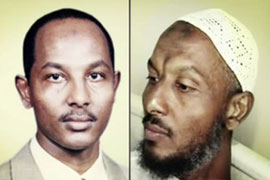Sudan minister defends weak al-Hajj
Claim by US official that freed Guantanamo detainee was faking illness ‘surprising’.

 |
|
Al-Hajj was carried off his flight from Guantanamo by US troops |
A Sudanese minister has refuted a US defence department official’s claim that Sami al-Hajj, a released detainee of Guantanamo Bay, was affecting weakness on his return from the camp to Sudan.
The US official had told ABC news that al-Hajj was “a manipulator and a propagandist”.
Dr Kamal Obeid, the Sudanese state minister for media affairs, said in an interview with Al Jazeera on Sunday that he was “surprised” to hear the remarks.
‘Exhausted’
He said that on his arrival in Khartoum, the Sudanese capital, from Guantanamo Bay early on Friday morning, “al-Hajj appeared exhausted, with very slow heart beats and low blood pressure.
| Your Views |
“When I grasped his hands, they were very cold, apparently affected by the cooling system in the aircraft.
“But when I greeted his other two colleagues, their bodies were much warmer.”
An official from the US state department said that he had viewed al-Hajj’s show of weakness as an attempt to influence public opinion.
Al-Hajj is an Al Jazeera cameraman who was travelling to Afghanistan to work for the television network in Pakistan in 2001 when he was taken by Pakistan forces and handed over to the US.
He was held for more than six years and never charged. He had been on hunger strike for almost 16 months in protest at his treatment.
‘Propaganda’
The US official said that al-Hajj’s propaganda style was impressive and criticised him for continually complaining about the maltreatment of detainees in Guantanamo Bay.
 |
| Images of al-Hajj before and after his detention in Guantanamo |
The official added that al-Hajj looked healthy and in good condition when he boarded the aircraft departing from Guantanamo Bay, which is on US military territory in Cuba.
Asked whether al-Hajj was simulating weakness, Dr Obeid said: “It was a national tradition in the Sudan that showing weakness to others, particularly women, relatives and others, is seen as shame, which is contrary to the standards of manhood.
“Only after he was drip-fed, that he was able to regain strength.
“After more than 400 days of hunger strike, al-Hajj needs more time to cope with normal feeding, as part of his digestive mechanisms have become dormant.”
‘Nonsense’
Asked on Al Jazeera’s Inside Story programme whether al-Hajj could have been faking illness, Wadah Khanfar, Al Jazeera’s director general, said that it was “nonsense”.
“I can tell you this is nonsense.”
| In Depth | |
|
|
“The medical reports that are released today from the hospital tell us that he was in a very difficult situation.
“This gentle man was sick in Guantanamo.
“Then he was transferred to Khartoum for more than 20 hours he was chained to his chair. He did not have food or go to the bathroom [on the flight].
“So he was in a very difficult situation.
“I cannot imagine that after so much time in jail these guys can accuse him of such a thing.
“They should be apologising and compensate for this time spent in jail not start accusing him once he has become a free man.”
No charge
Sami al-Hajj was not charged with any crime while held in Guantanamo Bay.
The US administration would not make public any allegations against him, saying only that he was an “enemy combatant” and a security threat.
Al-Hajj was force fed during his hunger strike.
Guantanamo Bay was opened in 2002 as part of the US’ “war on terror”.
There remain more than 250 prisoners held without charge in the camp.
